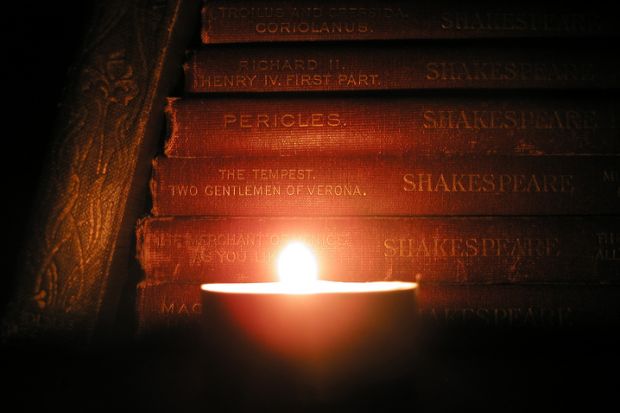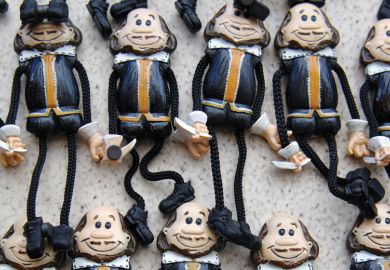A leading scholar has called for the creation of a Committee for the Protection of Shakespeare’s Text.
The New Oxford Shakespeare edition of the complete works, published earlier this year, claims that 17 of the 44 plays were in fact written collaboratively. Last month, the editors were confronted by their critics at a conference organised by Kingston Shakespeare, which by all accounts became acrimonious.
Now veteran Shakespearean Sir Brian Vickers, a distinguished senior fellow at the University of London’s Institute for Advanced Study, has written an open letter to colleagues describing “publication of The New Oxford Shakespeare as a crisis for our discipline”, since “a small group of scholars…have been able to apply new and untested – that is, by anyone outside the NOS circle – stylometric approaches which have resulted in their edition containing ‘38 per cent less’ of Shakespeare’s text, that proportion now attributed to [Christopher] Marlowe, [Thomas] Middleton and others”.
When Gary Taylor, general editor of The New Oxford Shakespeare, referred to “computerised textual analysis”, Sir Brian went on, it was “a phrase that strikes fear into the hearts of many scholars in Shakespeare studies who lack sufficient mathematical knowledge to evaluate the claims…Yet those of us familiar with traditional authorship attribution studies have failed”, for example, “to find any evidence of [Christopher] Marlowe’s hand in either the language or the prosody of the Henry VI plays”.
It was this that spurred Sir Brian to embark on “a worldwide investigation into the methods used to dilute the Shakespeare canon. I plan to set up a Committee for the Protection of Shakespeare’s Text” that would “invite evaluations from a wide range of independent scholars”. He also produced a satirical poster titled “The New Oxford Shakespeare-Lite”, advertising an edition where “We bring you the texts with 38% Less Shakespeare!!!”
Contacted by Times Higher Education, Sir Brian said that he had been “working on authorship attribution for 20 years now” and noted that “the collaborators in the five accepted co-authored [Shakespeare] plays were identified between 1850 and 1920”. “Shockingly,” he went on, “the NOS attributionists have ignored objective features of Shakespeare’s language that anyone can verify and any other type of non-mathematical evidence”. His proposed committee was designed to “explore the assumptions and methods of their experts, because I and several others do not accept their results”.
Asked to comment, Gabriel Egan, professor of Shakespeare studies at De Montfort University (and one of the scholars leading The New Oxford Shakespeare project), responded that “The New Oxford Shakespeare is made by scholars who teach and celebrate Shakespeare’s achievement and don’t think it is diminished by his collaboration with other writers – quite the opposite. At the time, Brian Vickers was appalled by the 1986-87 Oxford Shakespeare claiming that Shakespeare repeatedly co-authored plays, but 15 years later he accepted the fact and published his book Shakespeare, Co-Author.
“Vickers is now appalled again by The New Oxford Shakespeare finding more evidence for collaboration. He does not dispute that Shakespeare wrote very little of Henry VI, Part One and very little of Edward III. Vickers prefers Thomas Kyd, rather than Christopher Marlowe, as Shakespeare’s collaborator. How does it ‘preserve Shakespeare’s reputation’ to have him write with one playwright rather than another?
“We predict that Vickers will get over this new shock as he did the last one.”
Register to continue
Why register?
- Registration is free and only takes a moment
- Once registered, you can read 3 articles a month
- Sign up for our newsletter
Subscribe
Or subscribe for unlimited access to:
- Unlimited access to news, views, insights & reviews
- Digital editions
- Digital access to THE’s university and college rankings analysis
Already registered or a current subscriber?








